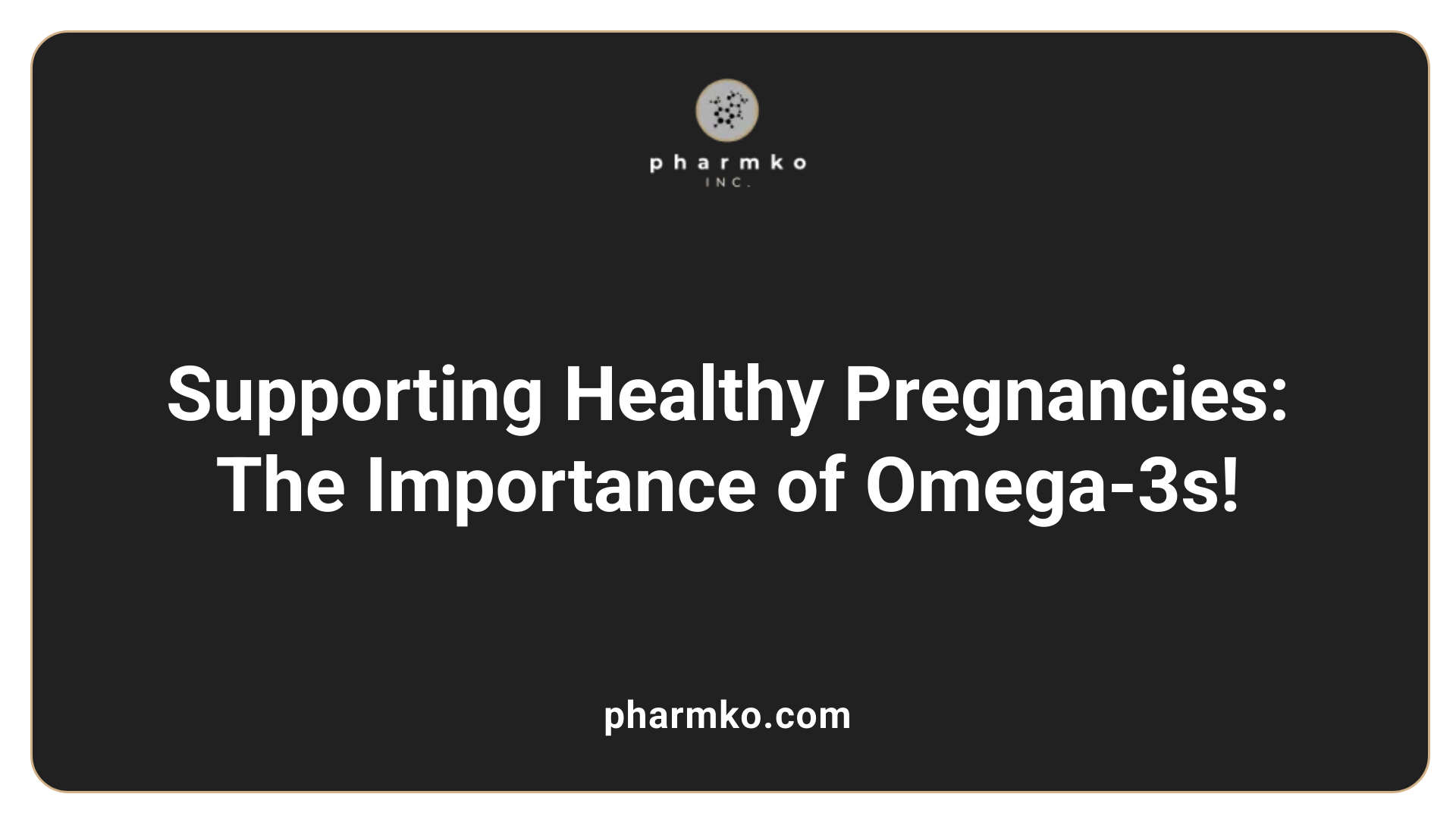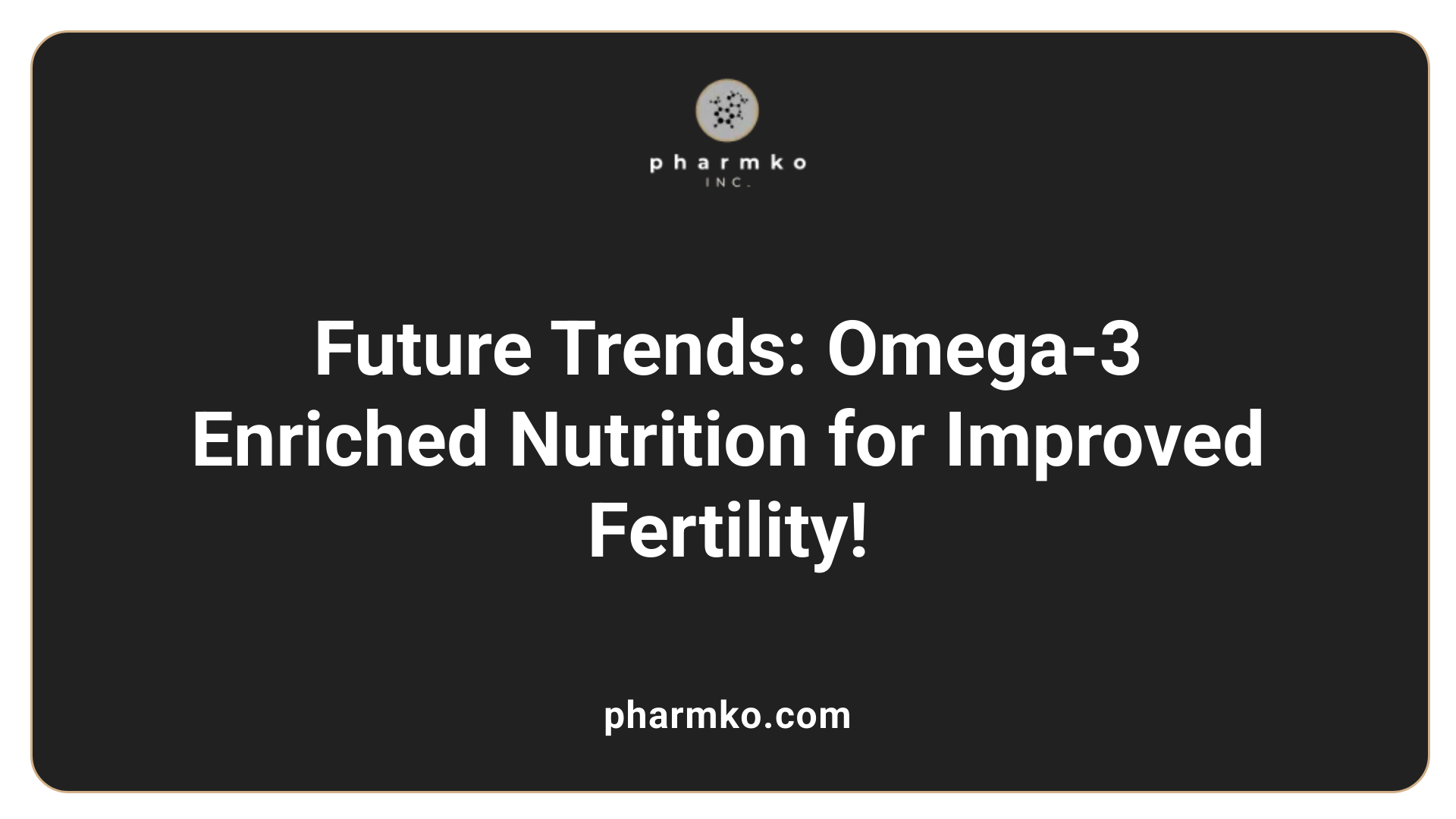The Role of Omega-3 Fatty Acids in TPN for Fertility Health
Understanding Omega-3 and Fertility
Omega-3 fatty acids have long been recognized for their benefits on heart and brain health, but emerging research highlights their crucial role in fertility health. With growing interest in how omega-3 supplementation can enhance reproductive outcomes, it's vital to explore their functions within Total Parenteral Nutrition (TPN) formulations, especially for individuals facing fertility challenges.
The Science Behind Omega-3 Fatty Acids

What omega-3 fatty acids are
Omega-3 fatty acids are essential lipids that our body cannot synthesize, necessitating their intake through diet. They are primarily recognized for their significant role in promoting overall health, particularly in reproductive functions.
Types of omega-3s: ALA, EPA, and DHA
There are three main types of omega-3 fatty acids:
- Alpha-linolenic acid (ALA) : Found in plant sources like flaxseeds and walnuts, ALA is beneficial for overall health and acts as a precursor to the other two types.
- Eicosapentaenoic acid (EPA) : Primarily sourced from marine life, EPA supports the anti-inflammatory response in the body.
- Docosahexaenoic acid (DHA) : Also derived from fish, DHA is crucial for brain health and reproductive health, particularly in supporting embryo implantation and hormonal regulation.
Importance of omega-3s in the body
Omega-3 fatty acids play multiple roles in maintaining health:
- They help regulate hormones necessary for ovulation.
- They improve blood flow to the uterus, enhancing the implantation of embryos.
- They possess anti-inflammatory properties that mitigate potential hormonal dysfunctions.
Can I take folic acid and omega-3 together?
Yes, you can take folic acid and omega-3 together without known adverse effects. Studies indicate that the combination of these nutrients may even provide additional benefits, such as more effectively reducing homocysteine levels and lowering blood pressure and oxidative stress markers. It’s important to consult with a healthcare provider before starting any new supplements to ensure it’s appropriate for your individual health needs. Additionally, combining these supplements is common, as seen in products that contain both. Overall, with medical guidance, taking folic acid and omega-3 together is generally considered safe.
Omega-3s and Female Fertility

Impact of omega-3 on egg quality
Research indicates that omega-3 fatty acids can enhance egg quality, especially in women experiencing age-related fertility decline. A study analyzing the effects on mice showed that higher omega-3 levels improved the quality of eggs, thereby increasing their chances for successful fertilization. For women, the 2019 study suggested that self-reported omega-3 supplementation enhanced the likelihood of conception, making omega-3s an important dietary consideration for those trying to conceive.
Regulation of hormones and ovulation
Omega-3 fatty acids play a pivotal role in hormonal regulation, which is vital for ovulation. They help maintain the structural integrity of cell membranes and influence hormonal signaling necessary for reproductive health. Additionally, omega-3s contribute to the regulation of hormones linked to ovulation, promoting regular cycles and aiding in the overall fertility process.
Effects on female reproductive lifespan
Evidence suggests that a diet rich in omega-3s may prolong reproductive function. Long-term omega-3 intake in animal models demonstrated a significant extension of reproductive lifespan into advanced maternal age. This suggests that omega-3 supplementation could be a feasible and inexpensive method to enhance fertility and mitigate the natural decline in egg quality associated with aging.
| Aspect | Description | Evidence |
|---|---|---|
| Egg Quality Improvement | Omega-3 supplementation has been shown to enhance egg quality in studies. | Study in mice and human cohorts shows improved fertilization chances. |
| Hormonal Regulation | Omega-3s support hormone balance and ovulatory function, which is critical for conception. | Involvement in hormonal signaling pathways. |
| Reproductive Lifespan | Lifelong dietary intake of omega-3s may extend reproductive function into older age, fostering hope for women facing age-related fertility challenges. | Animal studies indicate prolonged reproductive function. |
The Role of Omega-3 in Male Fertility

How do omega-3 fatty acids impact male fertility, specifically sperm count and testicular function?
Omega-3 fatty acids play an essential role in enhancing male fertility, particularly by improving sperm count and testicular function. A variety of studies have showcased substantial benefits attributed to these fatty acids, especially when sourced from fish oil supplements.
Men who incorporated omega-3 supplements into their diets for a duration of at least three months noted noteworthy improvements in their sperm health. These benefits include:
- Increased Sperm Counts: Regular intake has been linked to a rise in sperm production, crucial for successful conception.
- Enhanced Motility: Omega-3 fatty acids contribute to better sperm motility, thereby improving the ability of sperm to reach and fertilize an egg.
- Testicular Health: Enhanced size of testicles and elevated free testosterone levels were identified among men taking omega-3s, indicating improved testicular function.
Omega-3 fatty acids are crucial not only for the structural integrity of sperm cell membranes but also for regulatory processes involved in sperm function and fertilization. They may reduce inflammation that negatively affects reproductive health, promoting better hormonal balances within the male body.
Furthermore, a diet rich in omega-3s may also lower the incidence of erectile dysfunction. By supporting vascular health and improving blood flow, omega-3s can further bolster overall male reproductive health.
TPN Formulations: Enriching with Fish Oil
What are the benefits of adding fish oil to a Total Parenteral Nutrition (TPN) formulation?
Adding fish oil to a Total Parenteral Nutrition (TPN) formulation offers several benefits thanks to the omega-3 fatty acids it provides, including alpha-linolenic acid (ALA), eicosapentaenoic acid (EPA), and docosahexaenoic acid (DHA). These fatty acids are significant for reducing inflammation and may help lower the risk of infections, which leads to shorter hospital stays in critically ill patients.
Omega-3s are also known to enhance central nervous system and retinal health, particularly for infants who require specialized nutritional support. Furthermore, they contribute to maintaining healthy triglyceride levels while effectively lowering inflammatory markers in comparison to traditional omega-6 fatty acid emulsions.
Products like Omegaven, rich in omega-3s, provide essential fatty acids crucial for healthy infant development and are approved for use in pediatric patients suffering from parenteral nutrition-associated cholestasis.
The incorporation of fish oil in TPN formulations represents a substantial advancement in enhancing patient outcomes and overall nutritional support, particularly in critically ill populations.
Comparison with omega-6 fatty acid formulations
In contrast, traditional omega-6 fatty acid emulsions have been widely used in TPN; however, they can potentially elevate inflammatory markers. Balancing omega-3 and omega-6 fatty acids is essential, as excessive omega-6 intake may lead to chronic inflammation and related complications.
| Element | Omega-3 (Fish Oil) | Omega-6 |
|---|---|---|
| Inflammation | Reduces inflammation | Promotes inflammation |
| Developmental health | Enhances CNS and retinal development | Traditional emulsions do not target this |
| Patient outcomes | Shorter hospital stays | Potential for longer recovery periods |
| Use in pediatrics | Approved for cholestasis | Not specifically beneficial |
Clinical guidelines and research findings
Clinical guidelines by ASPEN recommend incorporating alternative oil-based intravenous fat emulsions containing omega-3 fatty acids into clinical practice due to their biochemical and clinical benefits. Recent studies have shown that omega-3s, particularly EPA and DHA, can influence inflammation positively and improve outcomes in various medical contexts, including fertility health and nutritional support.
The ESPEN guidelines further support the use of lipids rich in omega-3s for patients requiring parenteral nutrition, emphasizing their influence on overall health.
Adding fish oil into TPN not only aligns with current research but also represents an essential move towards improving nutritional strategies in patient care.
Omega-3 Fatty Acids and Pregnancy

What role do omega-3 fatty acids play during pregnancy?
Omega-3 fatty acids are vital during pregnancy, primarily for fetal brain and retina development. These essential fats serve as building blocks for neurological structures crucial for the baby's growth. Pregnant women are encouraged to consume at least 200 mg of docosahexaenoic acid (DHA), a prominent type of omega-3, through diet.
Typically, this intake can be achieved with 1 to 2 servings of low-mercury seafood each week. Not only does adequate consumption of omega-3s support fetal development, but it may also help prevent perinatal depression. Studies indicate a link between omega-3 intake and improved neurodevelopmental outcomes for children.
However, pregnant women may encounter concerns regarding mercury and other contaminants in fish. Public health guidelines emphasize that low-mercury fish, such as salmon and sardines, can be safely included in the diet during pregnancy. For those adhering to vegan diets, it is important to be conscious of omega-3 sources. They might require supplementation to meet their dietary needs as they navigate this crucial period of development.
| Aspect | Recommendation | Benefits |
|---|---|---|
| DHA Intake | 200 mg per day | Supports brain and retina development in the fetus |
| Seafood Servings | 1-2 servings of low-mercury fish | Prevents perinatal depression and improves neurodevelopment |
| Vegan Consideration | Consider omega-3 supplements | Necessary for meeting daily omega-3 requirements during pregnancy |
Mitigating Inflammation with Omega-3
Omega-3s in Reducing Inflammation
Omega-3 fatty acids are renowned for their anti-inflammatory properties. They work by displacing pro-inflammatory compounds in the body, such as arachidonic acid. This displacement not only promotes the production of anti-inflammatory compounds but also lowers free radical formation, contributing to improved overall health.
Impact on Reproductive Health
In the context of fertility, less inflammation can lead to enhanced ovarian function and better egg quality. The reduction in inflammatory responses may also optimize hormonal functions critical for reproduction. There’s evidence suggesting that omega-3s can benefit egg precursor reserves, ultimately improving chances of conception.
Benefits of Low Inflammation for Fertility
Maintaining a low inflammatory state supports hormonal balance and optimal neurotransmitter transmission. This balance is vital since hormones regulate many reproductive processes. Couples trying to conceive stand to benefit from omega-3 supplementation, potentially enhancing their chances of achieving pregnancy.
Clinical Evidence and Omega-3 Supplementation
Current research on omega-3s and fertility
Recent studies indicate that omega-3 fatty acid supplementation may significantly enhance fertility in women who are trying to conceive naturally. In a comprehensive analysis involving a cohort of 900 women across 2510 menstrual cycles, those taking omega-3 supplements demonstrated a 1.51 times higher probability of conception compared to those who did not use these supplements. This positive association persists even after controlling for factors such as age, obesity, and vitamin D intake, which is crucial for ensuring the findings are not skewed by biases.
The beneficial impact of omega-3 fatty acids—including DHA, EPA, and ALA—on reproductive health stems from their ability to regulate reproductive hormones and improve blood flow to the uterus, as well as enhance embryo implantation. Thus, omega-3 supplementation emerges as a promising avenue for women, particularly in light of the modern diet, which tends to favor omega-6 fats and may contribute to reproductive issues.
Need for further studies
Despite the encouraging findings, experts like Dr. Malgorzata Skaznik-Wikiel stress the necessity of further randomized controlled trials to validate these initial observations. While current data show potential benefits, additional research is required to confirm these effects across broader populations and to understand the mechanisms at play.
Recommendations from health organizations
Health organizations recommend an intake of about 1,000 mg of omega-3 fatty acids daily for couples striving for pregnancy. This advice advocates for using purified fish oil as a reliable source of DHA. Additionally, clinical guidelines by ASPEN and ESPEN suggest incorporating omega-3s in various nutritional strategies, particularly for those with fertility concerns. This multi-faceted approach underscores the relevance of omega-3s not just in nutrition but as a factor potentially enhancing fertility as well.
Omega-3 Dosage and Recommendations
What is the best omega-3 dosage for improving fertility?
The best omega-3 dosage for enhancing fertility is typically suggested at 500 to 1,000 mg daily for both men and women. This range supports overall reproductive health, optimizing hormonal regulation, improving sperm quality, and increasing egg viability. Remarkably, women aged 30 to 44 who consumed omega-3 supplements exhibited nearly double the likelihood of conceiving compared to those who did not.
Are there differences in dosage for men and women?
While the general recommendation applies to both genders, higher doses may be particularly beneficial for women with specific reproductive health concerns or age-related fertility declines. For men, maintaining the lower end of the recommended dosage is often sufficient to support sperm health. Fertility specialists may recommend dosages exceeding 2,000 mg , tailored to individual health needs, particularly in challenging fertility cases.
How can one ensure adequate EPA and DHA intake?
When selecting omega-3 supplements, it is crucial to check the amounts of EPA (eicosapentaenoic acid) and DHA (docosahexaenoic acid) , as these components are integral to fertility health. Supplements derived from purified fish oil usually provide a reliable source of these vital fatty acids. Consuming a balanced diet rich in omega-3s from fish can also help achieve the desired intake, ensuring optimal reproductive benefits.
Conclusion: The Future of Omega-3 Enriched Nutrition in Fertility

How Are Omega-3 Fatty Acids Related to Conception?
Research indicates that self-reported usage of omega-3 fatty acid supplements significantly increases the probability of conception for women trying to conceive naturally. In a study involving 900 women across 2,510 menstrual cycles, findings suggest that women taking these supplements were 1.51 times more likely to conceive than those who did not.
What Advantages Do Omega-3s Offer for Fertility?
Omega-3 fatty acids, particularly DHA, play a crucial role in fertility by:
- Supporting regulatory hormones essential for ovulation.
- Boosting blood flow to the uterus, which is vital for embryo implantation.
- Reducing inflammation that could hinder ovarian function. Moreover, these fatty acids are beneficial in enhancing sperm function, which further contributes to successful fertilization.
What Recommendations Are There for Omega-3 Intake?
For couples aiming to conceive, a daily intake of 1,000 mg of omega-3 fatty acids is recommended. Ideally, this should be sourced from purified fish oil, which is rich in DHA. This dietary strategy is suggested to be a feasible, cost-effective modifiable factor in improving fertility outcomes.
Why Is More Research Needed?
Even with promising findings, the need for further randomized controlled trials remains critical to confirm the benefits of omega-3s on fertility. Future studies may explore the long-term advantages and the potential of omega-3 enriched total parenteral nutrition (TPN) in enhancing reproductive health, especially in women of advanced maternal age. This ongoing research is vital for optimizing nutritional interventions aimed at improving reproductive success.
Embracing Omega-3 for Potential Fertility Benefits
As research into the benefits of omega-3 fatty acids continues, their potential impact on fertility health becomes ever clearer. Integrating omega-3s into Total Parenteral Nutrition (TPN) formulations offers a promising strategy for supporting reproductive health. Through careful consideration of dosage and continued research, omega-3 enriched nutrition holds the potential to improve fertility outcomes for many individuals and couples worldwide.
References
- Omega-3 fatty acid supplementation and fecundability - PMC
- Fertility Benefits of Omega-3 Fatty Acids | CCRM Fertility
- Prolonging the female reproductive lifespan and improving egg ...
- Omega-3s in Parenteral Nutrition | Fresenius Kabi - Caring For Life
- How Omega 3 Fats May Improve Fertility - Time
- Nutritional interventions in depression: The role of vitamin D and ...
- Fertility Benefits of Omega-3 Fatty Acids | CCRM Fertility
- Omega-3 fatty acids dietary intake for oocyte quality in women ...
- Fish Oil (Omega 3s) for Fertility - CNY Fertility













